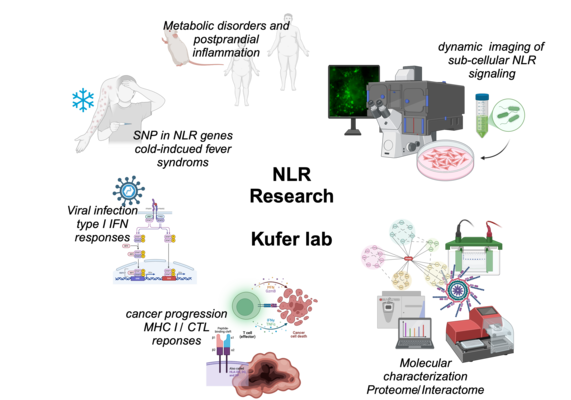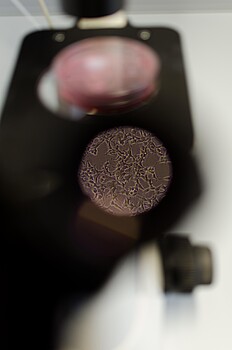Current Research
Research of the department of immunology is centered on the molecular and cell biological characterisation of proteins of the nucleotide-binding domain, leucine-rich repeat containing family (NLR) in humans and in mouse models. NLRs form a family of 22 ATPases with high physiological relevance. While the function of some NLRs in humans is still not well understood, several members have been shown to have essential functions as pattern-recognition receptors (PRR) in the innate immune response to pathogens and cell damage and the resulting induction of pro-inflammatory cytokines. The medical relevance of NLRs is underlined by hereditary diseases that are based on polymorphisms in NLR-encoding genes. Examples of such disease include bare lymphocyte syndrome, Blau syndrome, genetic predisposition to Crohn's disease and Familial Cold Autoinflammatory Syndromes (FCAS) (Kufer and Sansonetti 2011, Nat Immunol.).
The focus of our research is the functional analysis of these proteins in innate immunity, the regulation of immunological processes and NLR-associated diseases. This is done in close collaboration with several national and international colleagues (Sherbrooke University, Canada; Monash Medical Research, Melbourne, Australia; University of Lille, France).
We are also interested in the functions of NLR proteins in malignant transformation. Our research group has identified NLRC5 as a regulator of MHC class I genes (Neerincx et al, 2012, JI ). Ongoing projects are aimed at developing clinically applicable methods for the expression of NLRC5 in tumour therapy. In this context, it should be mentioned that we are also pursuing projects to analyse the function of NLRP11, which is highly expressed in some B-cell lymphomas (Ellwanger et al. 2018 JBC). For NOD1, we recently showed that this plays an important role together with the protein HAX-1 in the cell migration of tumour cells (Hezinger et al. 2023, FEBS Journal).
Other aspects of our research are the analysis of disease-associated polymorphisms in NLR genes and their molecular function. We were able to demonstrate this, for example, with mutations in NLRP12 in the context of immune defence in the intestine (Normand et al. 2018 Nat.Comm.). In particular, the elucidation of the still poorly understood activation of these proteins and their cell biology are the focus of ongoing work: In collaboration with the University of Bonn, we were able to contribute to the identification of a new function of NLRP10 as an inflammasome (Próchnicki et al. 2023 Nat. Immunol.). In addition, we were able to elucidate changes in the sub-cellular localisation of RIPK2 after NOD1/2 activation and their molecular basis (Ellwanger et al. 2019, Life Sci Alliance, Steinle et al. 2021, J Cell Sci).
A key focus of our research portfolio is immunological research in the context of nutrition and metabolic disorders. As a partner in the EU-funded project RESIST-PP (EU HDHL-NUTRIMMUN), we are currently investigating the postprandial immune response in healthy and overweight individuals and in the BMBF-funded project INDICATE-FH, we are analysing immune responses in the intestine in cases of food intolerance.
We are working on aspects of innate immune responses in the context of metabolic diseases. NLR proteins play an important role here (see our review article: Bauer et al. 2023, Int J Mol Sci.), In a diet model in mice, for example, we were able to show that NLRC5 has a new function in obesity (Bauer et al. 2023, iScience).


